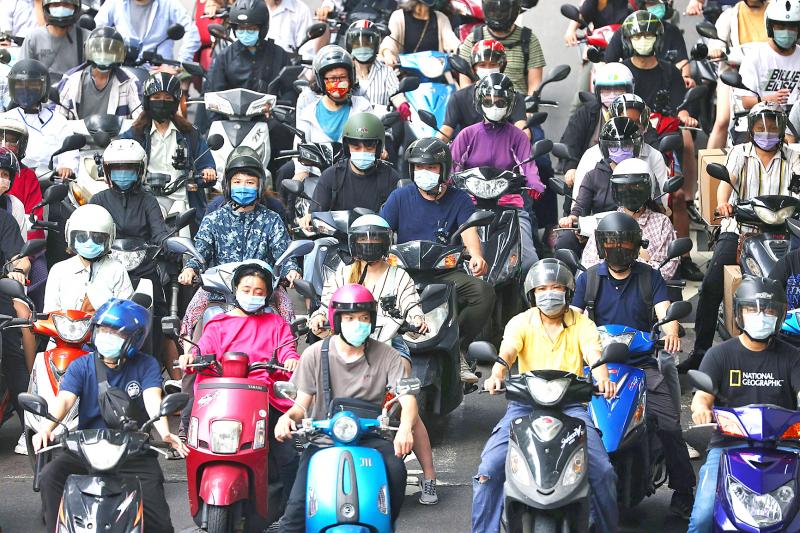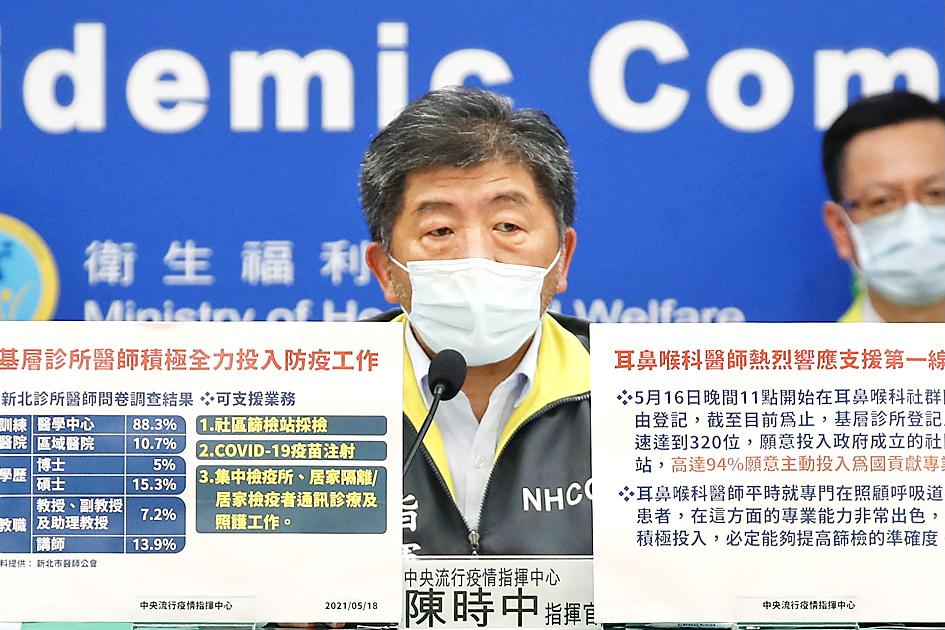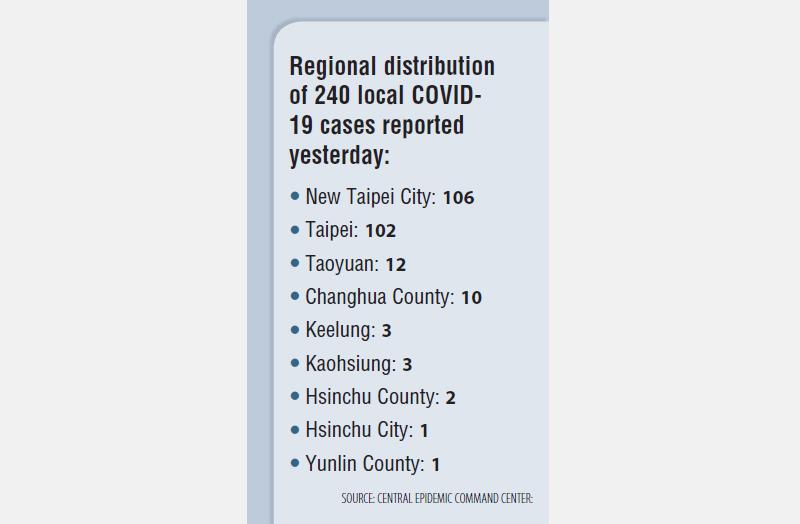Taiwan yesterday recorded 240 local and five imported cases of COVID-19, the Central Epidemic Command Center (CECC) said at a press conference in Taipei, adding that two people died of the disease on Monday.
The local cases comprise 128 female and 112 male patients, ranging in age from under five to more than 90 years old, said Minister of Health and Welfare Chen Shih-chung (陳時中), who heads the center.
New Taipei City had the most cases at 106, followed by Taipei with 102, Taoyuan with 12, Changhua County with 10, Keelung and Kaohsiung with three each, Hsinchu County with two, and one each in Hsinchu City and Yunlin County.

Photo: Ann Wang, Reuters
Eighty-eight of the cases are linked to a teahouse cluster in Taipei’s Wanhua District (萬華), 67 cases visited Wanhua recently, five cases are linked to three previously reported infection clusters and 51 cases have an unclear connection with the clusters, while 29 cases are still under investigation, Chen said.
The two COVID-19 deaths on Monday bring the total number of deaths in Taiwan to 14, he said.
One was a woman in her 60s who worked in Wanhua, developed a fever on Monday last week, sought treatment and was tested for COVID-19 on Friday, and whose test came back positive on Sunday, he said.

Photo: Ritchie B. Tongo, EPA-EFE
She was found lying in her home on Monday and pronounced dead at a hospital after emergency treatment, he said.
The other case was a hospitalized patient in his 80s who had chronic diseases and was a close contact of a confirmed case. The man tested positive for COVID-19 on Sunday. His health quickly deteriorated and he passed away on Monday.
“Although the number of confirmed cases has dropped slightly today, the COVID-19 situation is still very severe, and maintaining our medical and healthcare capacity is very important,” Chen said.

The CECC is grateful that many primary care physicians have voiced their willingness to help conduct COVID-19 testing in local communities, he added.
Changhua Christian Hospital Superintendent Chen Mu-kuan (陳穆寬), who is also the chairman of the Taiwan Society of Otorhinolaryngology-Head and Neck Surgery, said more than 320 ear, nose and throat primary care physicians have volunteered to help conduct COVID-19 tests at community testing stations.
“Our lives are bound together on this island, so let us work together to fight COVID-19,” he said at the press conference.
Primary care physicians feel a compelling obligation and have the expertise to assist the government in performing COVID-19 tests and vaccinations, as well as providing telemedicine or care services for people in quarantine or isolation, New Taipei City Medical Association chairman Chou Ching-ming (周慶明) said.
Chen Shih-chung urged people who have had close contact with a confirmed case or COVID-19-like symptoms to get tested.
However, “people who are only worried they might be infected should spend more time at home and thoroughly practice the ‘new disease prevention lifestyle,’ instead of going for a [COVID-19] test just to feel safe,” he said.
Medical resources are limited and should be preserved for people with more serious conditions, he added.
Centers for Disease Control Deputy Director-General Philip Lo (羅一鈞), deputy chief of the CECC’s medical response division, said that as of 9am yesterday, there were still 241 empty negative pressure isolation rooms available at hospitals across the nation.
Given the surge in confirmed cases in the past few days, infected patients are to be triaged for admission to determine whether they should stay in a negative-pressure isolation room, a designated isolation room in a hospital, or in a room in an enhanced centralized quarantine facility, depending on how severe or contagious their condition is, he said.
Separately, Taipei Mayor Ko Wen-je (柯文哲) said the testing positivity rate at temporary testing stations set up at Wanhua appears to be on the decline.
After posting rates of 11 percent on Friday, 9.7 percent on Saturday and 19 percent on Sunday, it dropped to 7.9 percent on Monday and 4.7 percent as of yesterday afternoon.
The decreasing positivity rate suggests the spread of the virus could be curbed if people would stop moving around, he said, adding that he hoped everyone can practice self-discipline to win the fight against COVID-19.

TRAGEDY STRIKES TAIPEI: The suspect died after falling off a building after he threw smoke grenades into Taipei Main Station and went on a killing spree in Zhongshan A 27-year-old suspect allegedly threw smoke grenades in Taipei Main Station and then proceeded to Zhongshan MRT Station in a random killing spree that resulted in the death of the suspect and two other civilians, and seven injured, including one in critical condition, as of press time last night. The suspect, identified as a man surnamed Chang Wen (張文), allegedly began the attack at Taipei Main Station, the Taipei Fire Department said, adding that it received a report at 5:24pm that smoke grenades had been thrown in the station. One man in his 50s was rushed to hospital after a cardiac arrest

SAFETY FIRST: Double the number of police were deployed at the Taipei Marathon, while other cities released plans to bolster public event safety Authorities across Taiwan have stepped up security measures ahead of Christmas and New Year events, following a knife and smoke bomb attack in Taipei on Friday that left four people dead and 11 injured. In a bid to prevent potential copycat incidents, police deployments have been expanded for large gatherings, transport hubs, and other crowded public spaces, according to official statements from police and city authorities. Taipei Mayor Chiang Wan-an (蔣萬安) said the city has “comprehensively raised security readiness” in crowded areas, increased police deployments with armed officers, and intensified patrols during weekends and nighttime hours. For large-scale events, security checkpoints and explosives

PUBLIC SAFETY: The premier said that security would be tightened in transport hubs, while President Lai commended the public for their bravery The government is to deploy more police, including rapid response units, in crowded public areas to ensure a swift response to any threats, President William Lai (賴清德) said yesterday after a knife attack killed three people and injured 11 in Taipei the previous day. Lai made the remarks following a briefing by the National Police Agency on the progress of the investigation, saying that the attack underscored the importance of cooperation in public security between the central and local governments. The attack unfolded in the early evening on Friday around Taipei Main Station’s M7 exit and later near the Taipei MRT’s Zhongshan

ON ALERT: Taiwan’s partners would issue warnings if China attempted to use Interpol to target Taiwanese, and the global body has mechanisms to prevent it, an official said China has stationed two to four people specializing in Taiwan affairs at its embassies in several democratic countries to monitor and harass Taiwanese, actions that the host nations would not tolerate, National Security Bureau (NSB) Director-General Tsai Ming-yen (蔡明彥) said yesterday. Tsai made the comments at a meeting of the legislature’s Foreign Affairs and National Defense Committee, which asked him and Minister of National Defense Wellington Koo (顧立雄) to report on potential conflicts in the Taiwan Strait and military preparedness. Democratic Progressive Party (DPP) Legislator Michelle Lin (林楚茵) expressed concern that Beijing has posted personnel from China’s Taiwan Affairs Office to its